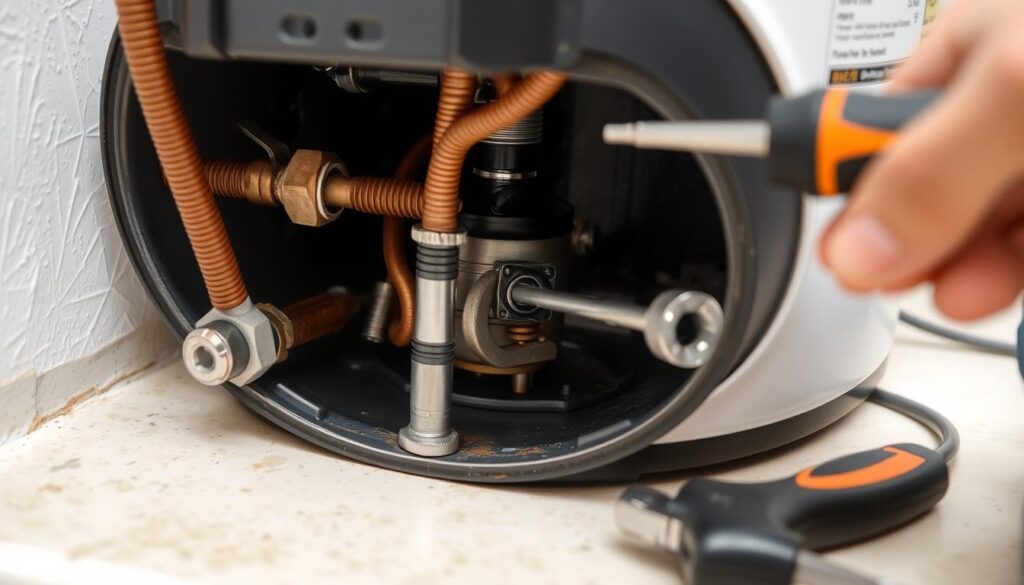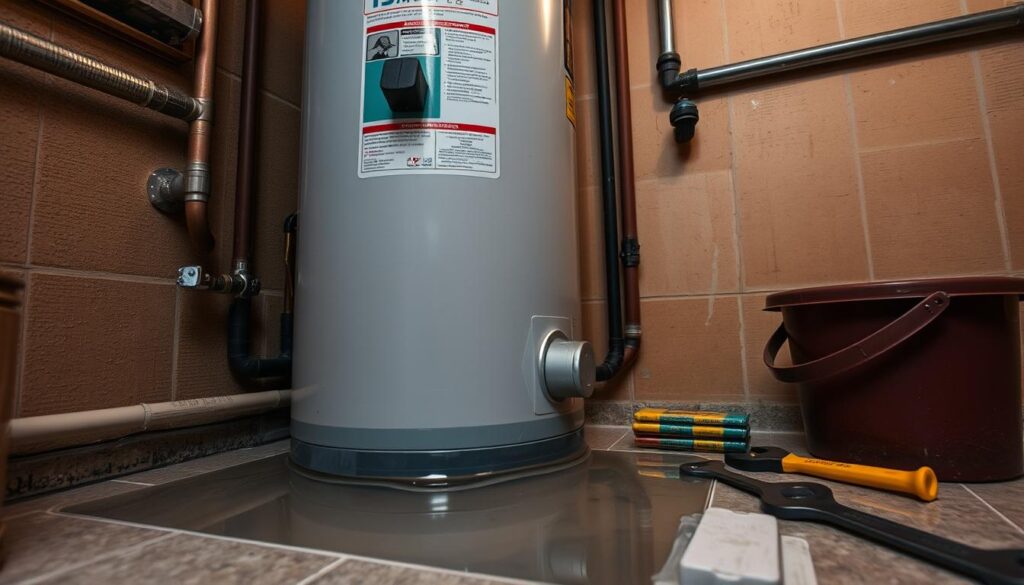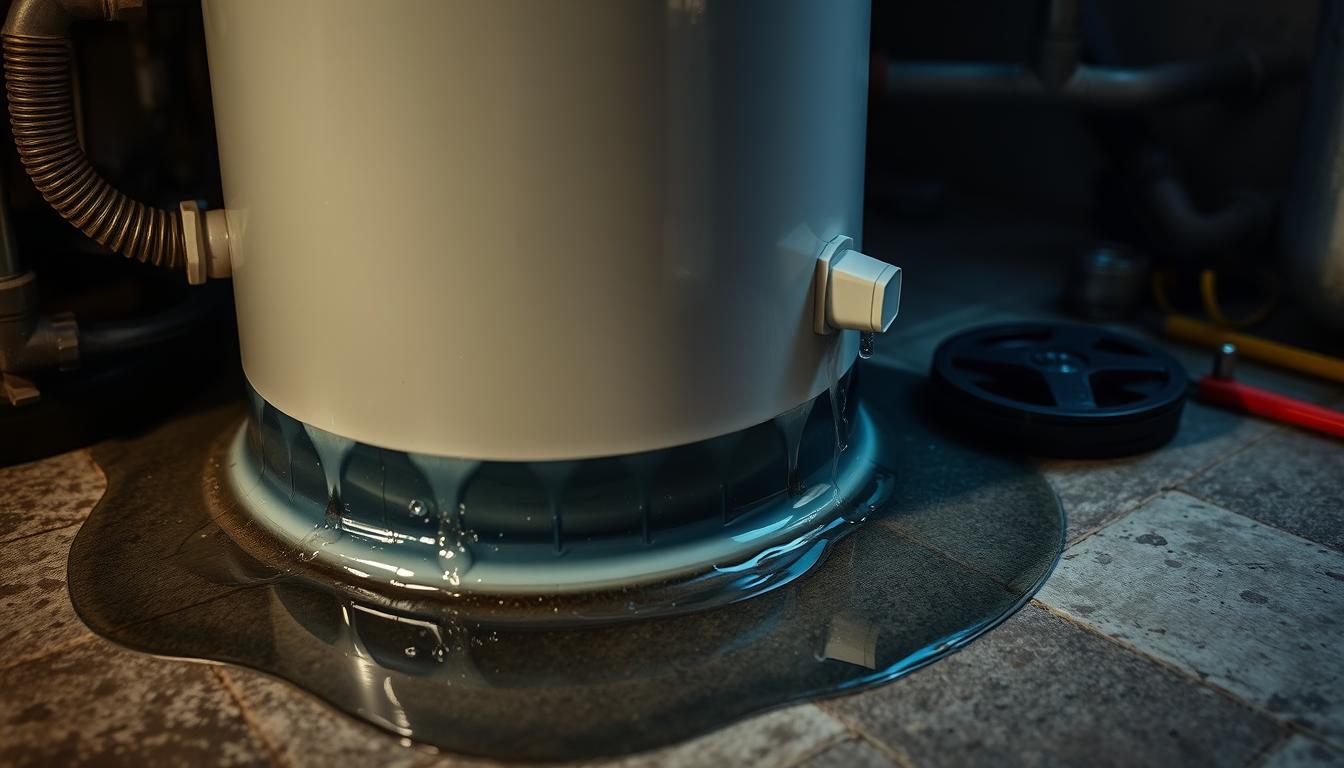Seeing a leaking water heater can be really frustrating and worrying. It might start with a small drip or grow into a big leak. This can cause water damage, mold, and expensive repairs if not fixed quickly.
But, you’re not alone in this problem. There are steps you can take to fix it and stop more damage.
Table of Contents
water heater leaking from bottom
Understanding Water Heater Leaks
Water heater leaks can be frustrating and damaging. They often start small but can cause big problems if not fixed. Knowing why leaks happen and how to spot them can help you fix them fast.
Common Causes of Leaks
Leaks in water heaters can come from many sources. Corrosion, faulty drain valves, and sediment build-up are common reasons. Over time, the tank can corrode, causing holes or cracks. Worn-out drain valves can also let water leak out.
Signs Your Water Heater is Leaking
- Water pooling around the base of the water heater
- Decreased hot water supply or unusual noises and vibrations coming from the unit
- Water stains or moisture on the panels of the water heater
Importance of Timely Repairs
Fixing water heater leaks quickly is key to avoid bigger problems. Small leaks can turn into big water damage and safety risks. Regular checks and maintenance can catch leaks early, saving you money and hassle.
“Acting quickly is crucial when dealing with water heater leaks, regardless of the leak size, to avoid potential hazards and damages.”
Safety First: What to Do Immediately
When you notice a leak in your water heater, safety comes first. Your home and family are at risk. Here’s what to do right away to protect them and prevent water damage.
Disconnect Power Supply
First, turn off the power to your water heater. For electric models, find the circuit breaker and switch it off. If it’s gas-powered, turn the gas valve to “Off”. This stops the risk of shock or leaks.
Shut Off the Water Supply
Then, turn off the water supply to the heater. Look for the cold water shut-off valve at the top and turn it clockwise. This stops the leak and prevents more damage.
Preventing Water Damage
Quickly move any valuable items or electronics away from the leak. Use towels, buckets, or a wet/dry vacuum to soak up water. This helps protect your floors, walls, and other belongings from damage.
By acting fast, you can reduce the risks of a leaking water heater. This makes it easier to find and fix the problem.
Diagnosing the Source of the Leak
When you notice a leak in your water heater, finding the leak’s source is crucial. This step helps you figure out if a simple fix or a bigger replacement is needed. Let’s look at the main spots to check when you’re trying to find a water heater leak.
Inspecting the Drain Valve
First, check the drain valve at the water heater tank’s bottom. It can corrode or get loose over time, causing leaks. Look for any damage or wear on the drain valve. If you find any, tighten or replace it.
Checking the Water Inlet and Outlet
Then, examine the water inlet and outlet at the tank’s top. Leaks can happen here if the connections get loose or damaged. Look for any drips or moisture. If you see any, tighten the fittings or replace the washers.
Examining the Tank for Corrosion
Older water heaters can corrode, causing leaks. Inspect the tank, especially the bottom and sides, for rust, pitting, or cracks. If you see a lot of corrosion, it might be time for a new water heater.
By checking these important areas, you can usually find where the leaking water heater tank is leaking. If the leak is big or you can’t find the source, it’s wise to get a professional plumber to help.
Fixing Leaks: Quick Temporary Solutions
Acting fast is key when your water heater leaks. This helps prevent water damage and keeps you safe. While getting a pro to fix it is best, there are quick fixes to stop the leak for now.
Using Plumber’s Tape
Applying plumber’s tape, or Teflon tape, is an easy fix. It’s for the threaded connections on your water heater. It can make a tighter seal and stop small leaks around fittings and joints.
Tightening Loose Connections
Check the water inlet and outlet connections, and the drain valve. Use a wrench to tighten any loose fittings. But, be careful not to over-tighten, as it can harm the connections.
Employing Epoxy for Small Punctures
For small holes or cracks in the tank, use a high-temperature epoxy made for plumbing. It can seal the leak temporarily. But, remember, it’s just a quick fix and you might need a pro to fix it for good.
These quick fixes are not a permanent solution. They’re just to stop leaks until a pro can fix it right. Always turn off the power and water before starting any repairs to stay safe.
When to Call a Professional Plumber
Some water heater leaks can be fixed with simple steps. But, there are times when you need a professional plumber. If the leak won’t stop or you see signs of a bigger problem, like a gas leak, get expert help.
Signs You Need Expert Help
Here are some signs you should call a plumber:
- You can’t find where the leak is coming from.
- There are problems with complex valves or parts.
- Your water heater is over 10 years old.
Seeing rust-colored water, hearing strange noises, or noticing it’s always running are also warning signs. If you can’t fix it yourself, it’s time to call a pro.
Choosing the Right Plumbing Service
When picking a plumber for your water heater, choose a reputable one with experience. Argent Heating & Cooling, LLC, a woman-owned business in Fairfax, VA, is known for its water heater expertise.
Cost Considerations for Repairs
Repair costs vary based on the problem and your water heater’s age. Sometimes, replacing an old unit is cheaper than fixing it. Your plumber can give you a detailed cost estimate to help you decide.
“Don’t wait until your water heater is leaking significantly to call in a professional. Early intervention can often prevent more costly and time-consuming repairs down the line.”
Long-Term Solutions to Prevent Future Leaks
Keeping your water heater in good shape is key to avoiding expensive leaks and replacements. By taking a few simple steps, you can make your water heater last longer. This helps protect your home from water damage.
Regular Maintenance Tips
One great way to stop leaks is through regular water heater maintenance. This means flushing the tank yearly to clear out sediment. Sediment buildup can cause corrosion and leaks. Also, check and replace the anode rod to fight rust and extend the tank’s life.
Importance of Periodic Inspections
Regular checks of your water heater’s parts are also crucial. Look at the pressure relief valve, drain valve, and all connections for wear or looseness. Finding problems early can save you from expensive water heater leaks.
Upgrading to a More Reliable Model
If your water heater is old or has many problems, it might be time for a new one. Consider a tankless water heater or one with better corrosion protection. These can be more reliable and less likely to leak in the future.
| Maintenance Task | Recommended Frequency |
|---|---|
| Flushing the Tank | Annually |
| Anode Rod Replacement | Every 2-3 Years |
| Pressure Relief Valve Test | Yearly |
By sticking to these long-term plans, you can greatly lower the chance of water heater leaks. This ensures your home stays comfortable and safe for many years.

Understanding Different Types of Water Heaters
Choosing the right water heater is key when installing or replacing one. There are two main types: tank-style and tankless. Each has its own advantages and disadvantages. Water heaters can also run on electricity or gas, affecting their cost and efficiency.
Tank vs. Tankless Water Heaters
Tank-style water heaters hold a lot of water, ready to use anytime. They’re often cheaper to install or replace. Tankless water heaters, however, only heat water when needed. They’re more energy-efficient but cost more upfront.
Electric vs. Gas Water Heaters
Electric water heaters are simpler to install and maintain. They’re also cheaper to run. But, gas water heaters can save money over time, especially for big families.
Pros and Cons of Each Type
- Tank water heaters: Pros – Affordable, readily available; Cons – Require more space, less energy-efficient
- Tankless water heaters: Pros – Space-saving, energy-efficient; Cons – Higher upfront costs, may require additional electrical or gas upgrades
- Electric water heaters: Pros – Easier installation, lower maintenance; Cons – Higher operating costs, may not be suitable for large households
- Gas water heaters: Pros – Lower operating costs, better for high-demand households; Cons – More complex installation, potential safety concerns
Think about your household size, energy costs, and space when picking a water heater. A professional plumber can help choose the best one for you. This ensures a smooth installation or replacement.
Common Myths About Water Heater Leaks
There are many wrong ideas about water heater leaks. Knowing the truth can help you take better care of your water heater.
Misconceptions About DIY Repairs
Some people think they can fix all water heater leaks by themselves. But, not all leaks are easy to fix. Small leaks might need a quick fix, but big ones need a pro.
Trying to fix big problems without the right skills can cause more harm. It might even be dangerous.
Myths Regarding Water Heater Lifespan
Many believe water heaters last only 10 years. But, how long one lasts really depends on how well it’s taken care of. Keeping your water heater clean and well-maintained can make it last longer than 10 years.
Understanding Warranty Limitations
Some think their water heater’s warranty covers everything. But, most warranties only cover certain parts, not the work to fix them. It’s key to know what your warranty does and doesn’t cover.
By clearing up these myths, you can make smarter choices about water heater troubleshooting and water heater maintenance. This way, your water heater will work well and safely for a long time.
Emergency Protocols for Severe Leaks
When you face a severe water heater leak, it’s vital to act fast. This helps reduce damage and avoid more problems. The first thing to do is to quickly control the situation and protect your home.
Temporary Measures to Control the Situation
If you see a big water heater leak, turn off the power first. This could be an electrical breaker or the gas supply. Then, find the water shut-off valve and close it to stop the water flow.
After shutting off power and water, use buckets, mops, or a portable pump to remove water. This action prevents more damage to your home. It also lets you see how bad the problem is.
Contacting Insurance Providers
After a severe water heater leak, call your insurance provider right away. Your policy might cover repair or replacement costs, and water damage to your home. Be ready to share details about the leak, like when it happened and what you’ve done so far.
Documenting Damage for Claims
To support your insurance claim, document the damage well. Take clear photos and videos of the affected areas. Also, save any receipts for emergency repairs or water removal services. This evidence is key to showing the damage and backing your claim.
If the damage is big, think about getting help from a water damage restoration service. They can assess the damage and guide you on how to fix it. Their help can prevent mold or structural damage and make sure your home is safe and restored.

The Role of Temperature and Pressure Relief Valves
Your water heater has a key safety device called the temperature and pressure (TPR) relief valve. It stops dangerous tank explosions by letting out extra pressure or heat. This helps keep your water heater safe.
Importance of TPR Valves
The TPR valve opens when the tank’s pressure gets too high or the temperature hits about 210 degrees Fahrenheit. It lets out water or steam, stopping a big failure. It’s very important for your water heater to work right.
How to Check if They’re Functioning Properly
- Every year, test the TPR valve by lifting the lever and checking if water flows well from the discharge pipe.
- If the valve doesn’t close right or leaks after testing, a pro plumber needs to replace it.
Addressing Malfunctions
A bad TPR valve can cause leaks or be very dangerous. Things like sediment, high pressure, or thermal expansion can mess with it. Keeping your water heater clean and maintained helps a lot. If your TPR valve isn’t working, call a licensed plumber for help.
| Cause of TPR Valve Malfunction | Potential Issues | Recommended Solution |
|---|---|---|
| Sediment Buildup | Interferes with valve operation | Regular tank flushing |
| High Water Pressure | Excessive pressure triggering valve | Install pressure regulator or expansion tank |
| Thermal Expansion | Excess pressure from temperature increase | Install expansion tank |
Keeping your water heater’s TPR valve in good shape is key for safety and reliability. Knowing its importance and following the right maintenance steps can prevent leaks and big problems.
Upgrading Your Water Heater: What to Consider
When it’s time to upgrade your water heater, think about a few key things. Your household’s hot water needs, the space you have, and how energy-efficient it is are all important. By looking at these factors, you can pick a water heater replacement that fits your home well and saves you money in the long run.
Factors to Consider Before Replacement
Before you buy a new water heater, figure out how much hot water you need. Think about your household size, the number of bathrooms, and any future changes. This will help you choose a water heater that’s just right for you.
Energy Efficiency Ratings
Energy efficiency is key when upgrading your water heater. Look for models with the ENERGY STAR label. They use less energy than regular ones, saving you money on your bills over time.
Installation Options and Costs
The type of water heater and where you put it can change the cost. For example, tankless water heaters might need special electrical work. Also, how easy the water heater installation is can affect the price. Talk to a plumber to get a clear idea of what you’ll need to spend.
Getting a new, energy-efficient water heater has many benefits. It makes your water heater work better and last longer, and it saves you money. By thinking about your needs, energy efficiency, and installation costs, you can choose wisely for your home.
Resources and Tools for Homeowners
Keeping your water heater in good shape and fixing leaks needs the right tools and info. Having basic plumbing tools like pipe wrenches, thermometers, and voltage testers is key. Also, online resources from makers, government sites like energy.gov, and plumbing groups offer great help on fixing and caring for your water heater.
Essential Plumbing Tools
Having the right tools is crucial for water heater upkeep. Get a set of pipe wrenches, a digital thermometer, a voltage tester, and other plumbing essentials. These tools help with tasks like tightening, checking temperatures, and spotting electrical problems.
Finding Reliable Online Resources
The web is full of info on water heater care and fixes. Check out manufacturer sites for manuals, guides, and tips for your model. Sites like energy.gov have lots on saving energy with water heaters. Plumbing groups also have forums and articles for common issues.
Community Help and Support Resources
Don’t overlook your local community for help. Many hardware stores have workshops on home care, including water heaters. Join online forums or social media groups for advice from others who’ve dealt with similar problems. Always be safe and call pros for tricky fixes or if unsure about DIY repairs.
